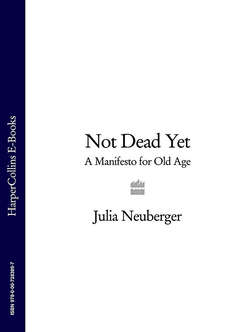Читать книгу Not Dead Yet: A Manifesto for Old Age - Julia Neuberger - Страница 8
3 Don’t take my pride away: end begging for entitlements
ОглавлениеThen there is the question of money. The finer points of pensions are too abstruse and obscure for this kind of book, but what might older people expect as a basic minimum income, what might they be expected to pay for care out of that, and what things should be provided free or cheaper because people are older? Also, what is a reasonable proportion of wealth that should be left to our children?
Old age is not what it used to be. More of us will get there, and it is likely to last longer for most people than it used to. Better health and lower death rates mean that each successive generation is more likely to reach 65. Men now in their forties are nearly 90 per cent likely to collect their state pension, and the likelihood for women is over 90 per cent.
The concept of a long retirement is fairly new. The original state pension was set with a starting age where people were expected to live a few months or years, rather than several decades. This scenario of being retired for decades has many implications for financing old age, and that is where the political debate has tended to be. But it has equally important implications for people making choices about how they want to live, as well as around the support they may require. All over Europe, parents also want to pass their wealth onto their children and the children expect to inherit homes.
There are huge disparities and inequalities in income and wealth for older people. Some of this is sudden, brought about by old age and inadequate pension provision. In other circumstances, we see poor older people who have been poor all their lives, and then the question is whether we should try to redistribute older people’s income to alleviate the worst of the misery in older old age.
Meanwhile, governments around the world, and particularly in Europe, are concerned at the effect the pensions ‘time bomb’ will have upon the wider society, and are using rhetoric that seems to blame older people for staying alive. Older people are becoming angrier about broken promises around financial and other support in old age, although arguably not angry enough, and younger people are beginning to fear what has hitherto always seemed to them to be impossibly far in the future.
